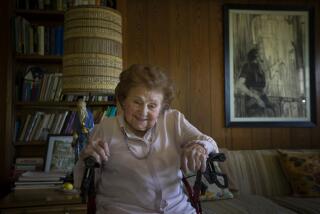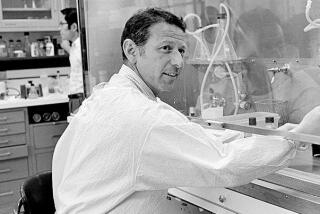Yosef Burg; Israeli Founding Father
- Share via
JERUSALEM — Yosef Burg, an Israeli founding father, longtime Cabinet minister and advocate of coexistence between religious Jews and secular Israelis, died Friday at a Jerusalem hospital. He was 90.
The German-born Burg, who escaped to pre-state Palestine just before the outbreak of World War II in 1939, was a figure of moderation and reconciliation in Israel’s rough and tumble political scene. A Cabinet minister for more than three decades, he earned a reputation as a political survivor, having served governments headed by the Labor Party and the Likud coalition.
“His most important legacy is that he tried to build a bridge over the biggest gulf in Israeli society, the gulf between religious and secular Jews,” said Israel’s elder statesman, former Prime Minister Shimon Peres.
“He was a religious man but he believed in compromise.”
Prime Minister Ehud Barak said Burg took the path of moderation and tolerance and showed a love for Jewish traditions.
Burg was an avuncular man with a round face and glasses, famous for his erudite wit. Political writers dubbed his appearances at question time in parliament “Burgtheater,” after the famous playhouse in Vienna.
Born in Dresden, Germany, Burg was studying in Berlin when the Nazis came to power in 1933, but he managed to complete his doctorate in mathematics and logic as well as become an ordained rabbi.
While attending the University of Leipzig, he was active in the Young Mizrahi religious Zionist movement. He risked arrest by arranging religious services in private homes after the synagogues were burned and worked underground to help German Jews escape to England and the Netherlands. His mother and grandmother died in concentration camps.
In 1939 he came to Palestine, and worked as a high school teacher, but was soon elected to the executive committee of the Jewish Agency, which served as a pre-state shadow government for the Jews in Palestine.
He was elected to the first Knesset, Israel’s parliament, in 1949 and served for the next 40 years.
He was one of the founders of the National Religious Party, which has been a coalition partner in almost every Israeli government, whether of the right or the left.
Burg viewed the party as a bridge between the ultra-Orthodox and the secular, and between the left and right wings in Israeli politics. He had a habit of hyphenating the expression “national religious,” and when he was asked which of the two elements was more important in the doctrine of his party, he quipped “the hyphen.”
For 19 years, the party played a centrist role in Israeli politics, but when Israel captured the West Bank and the Gaza Strip in the 1967 Mideast war, the younger generation in the party moved rapidly to the right. For them, the West Bank was the heartland of the biblical land of Israel and they led the movement to establish Jewish settlements there.
Burg remained a Cabinet minister until October 1988, but the leadership of the party had long since passed into the hands of the younger generation. He served in the Cabinet for 38 years.
His longevity was attributed to his cautious style, which was a factor in his selection in 1977 to head peace negotiations with Egypt.
“Historical developments are not to be measured with a stopwatch,” he said at the time, “but with a calendar.”
Burg wholeheartedly supported the 1979 land-for-peace deal, but many in his party opposed it, fearing an Israeli withdrawal from the Sinai Peninsula would set a precedent for a pullback from the West Bank.
In addition to Hebrew and German, Burg spoke English, French, Spanish, Latin, Greek and Yiddish.
He is survived by his wife, a son and a daughter. The son, Avraham Burg, is the current speaker of Parliament.
Burg’s funeral is scheduled for Sunday.
More to Read
Sign up for Essential California
The most important California stories and recommendations in your inbox every morning.
You may occasionally receive promotional content from the Los Angeles Times.












